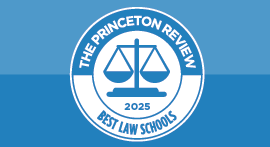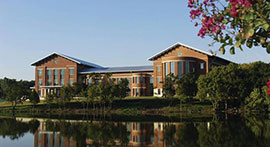Overview
Test Scores
(enrolled students)
Deadlines
Application Process
Other Admission Factors
LSAT Score
Undergraduate GPA
Letters of Recommendation
Essay / Personal Statement
Selectivity Rating
Faculty Information
Students Say
UT’s size does come with some downfalls. Specifically, students battle with the reams of red tape typical to large public institutions. “Since the law school is only one small part of the huge bureaucratic entity that is the University of Texas, things can sometimes get confusing—paying tuition, for instance, is done through one entity (not the law school), obtaining a student ID is done through another, financial aid through another, residency through another, etc.” Students also note that there have been recent upheavals in the administration, and “a lot of faculty drama that happens behind the scenes.” At the same time, the school works to mitigate the class size by dividing students into smaller study groups through a program known as the society system, to good effect: “The society system, which makes the large class size manageable and gives each student a smaller social group to interact with on a regular basis, helps greatly in personalizing the school and allaying feelings of being overwhelmed and alone in the school environment.” Overall, students at UT Austin agree that, “the experience is comparable to an elite private school,” but without the hefty price tag. With its low in-state tuition costs, “UT is probably the best value law school in the country for in-state students,” while qualified “out-of-staters can either acquire residency (and get in state tuition) after a year at UT, or else can negotiate an in-state rate as a kind of scholarship offer.”
Real-world preparation is taken seriously at UT Law. In addition to substantive courses in the curriculum, “students can and should participate in novice mock trial and moot court if they want more ‘hands on’ courtroom experience, even as 1Ls.” “Being located in the state capital provides many government-related opportunities not available elsewhere,” and the school offers “a lot of clinics and internship programs that allow students to get tons of real-world practice in law.” Widely considered the “best in Texas,” UT’s “greatest strength is its regional ties. It is well-placed among two very large legal markets (Dallas and Houston), which boast salaries on par with New York, D.C., and LA along with a much lower cost of living.” For better or for worse, one would be hard pressed to find a particular angle in recruiting either. “The school seems to place well enough in firms, nonprofits, and government, but does not excel in any one of those.”
Career overview
Career Services
Graduates Employed by Area
Graduates Employed by Region
Prominent Alumni
Dates
Financial Aid Statistics
Expenses per Academic Year
Student Body Profile
Demographics
Campus Life
Students Say
On the whole, the law school maintains a very “laid-back environment,” populated by students who are “accomplished, mature, and professional.” When it comes to making friends and networking, UT’s size is again a benefit. “The school is big enough that you can find any crowd you want to hang out with, and study anything you want with an expert in the field.” Competitiveness is generally kept under wraps, and most people “seem to have a good sense of humor about our experience which does wonders for our morale.” Off campus, opportunities for nightlife and recreation abound. A nationally famous, fun, and funky metropolis, “Austin is a terrific city and everyone wants to stay once they come to school here.”
More Information
Admissions Office Contact
Assistant Dean for Admissions & Financial Aid
Austin, TX 78705



